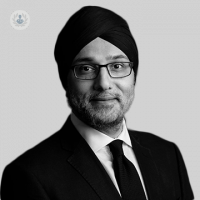Slipped disc: What it is, and what it isn’t
Autore:Slipped disc is extremely common – but it’s not as bad as it sounds. Consultant neurosurgeon Mr Ranjeev Bhangoo is here to explain why the term “slipped disc” can be a little misleading, what the outlook is if you have a slipped disc, and when treatment might be necessary.

What is a slipped disc?
As most of us know, our spine is made up of small bones called vertebrae. Each of these is separated by an intervertebral disc. The function of the vertebrae is to protect the spinal cord, which runs all the way down the back from the head and is essential to functioning whilst the disc act as shock absorbers.
When you hear the term “slipped disc”, it sounds as though the intervertebral disc has moved from its original position. This is actually not what happens.
A slipped disc is more like a hernia – there’s a rupture in the disc, and some of the gel-like fluid leaks out. This is why doctors often use the terms “bulging disc”, “herniated disc”, “disc protrusion” and “prolapsed disc” instead.
We are not sure why some people get a slipped disc and others do not. It is often triggered by putting pressure on the spine by lifting, being overweight, sitting too much, or even just by sneezing. A minor trigger might cause a slipped disc for one person, while the next person might experience no problems at all.
We do know, however, that slipped disc affects us more as we age.
What are the consequences of having a slipped disc?
Generally, pain is the main symptom, caused by the leakage pressing on nearby nerves. Pain may be experienced down the leg as well as in the back (this is known as sciatica).
However, the size of the herniated part does not always correspond to pain. Many people can have a slipped disc without realising it as they have no symptoms at all.
For some people, the herniated part is absorbed over time and the symptoms improve over a period of weeks or months. For others, symptoms improve when the herniated part simply becomes less inflamed.
During this time it’s important to remain active, trying to do as much as you normally do, and carrying on with work.
How is it treated?
If your symptoms do not improve on their own, the first line of treatment is usually medication in the form of non-steroidal anti-inflammatory drugs or neuropathic agents.
If this fails to improve symptoms, you might be referred to a group exercise programme, sometimes in combination with a psychological programme.
Finally, if symptoms still persist, or you are starting to experience weakness, surgery might be considered. Surgical options include:


